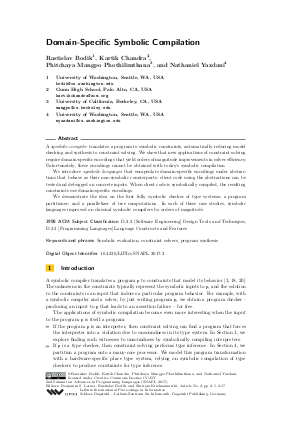Domain-Specific Symbolic Compilation
Authors Rastislav Bodík, Kartik Chandra, Phitchaya Mangpo Phothilimthana, Nathaniel Yazdani
-
Part of:
Volume:
2nd Summit on Advances in Programming Languages (SNAPL 2017)
Part of: Series: Leibniz International Proceedings in Informatics (LIPIcs)
Part of: Conference: Summit on Advances in Programming Languages (SNAPL) - License:
 Creative Commons Attribution 3.0 Unported license
Creative Commons Attribution 3.0 Unported license
- Publication Date: 2017-05-05
File

PDF
LIPIcs.SNAPL.2017.2.pdf
- Filesize: 1.99 MB
- 17 pages
Document Identifiers
Subject Classification
Keywords
- Symbolic evaluation
- program synthesis
- DSLs
Metrics
- Access Statistics
-
Total Accesses (updated on a weekly basis)
0Document
0Metadata
Abstract
A symbolic compiler translates a program to symbolic constraints, automatically reducing model checking and synthesis to constraint solving. We show that new applications of constraint solving require domain-specific encodings that yield the required orders of magnitude improvements in solver efficiency. Unfortunately, these encodings cannot be obtained with today's symbolic compilation. We introduce symbolic languages that encapsulate domain-specific encodings under abstractions that behave as their non-symbolic counterparts: client code using the abstractions can be tested and debugged on concrete inputs. When client code is symbolically compiled, the resulting constraints use domain-specific encodings. We demonstrate the idea on the first fully symbolic checker of type systems; a program partitioner; and a parallelizer of tree computations. In each of these case studies, symbolic languages improved on classical symbolic compilers by orders of magnitude.
Cite As Get BibTex
Rastislav Bodík, Kartik Chandra, Phitchaya Mangpo Phothilimthana, and Nathaniel Yazdani. Domain-Specific Symbolic Compilation. In 2nd Summit on Advances in Programming Languages (SNAPL 2017). Leibniz International Proceedings in Informatics (LIPIcs), Volume 71, pp. 2:1-2:17, Schloss Dagstuhl – Leibniz-Zentrum für Informatik (2017)
https://doi.org/10.4230/LIPIcs.SNAPL.2017.2
BibTex
@InProceedings{bodik_et_al:LIPIcs.SNAPL.2017.2,
author = {Bod{\'\i}k, Rastislav and Chandra, Kartik and Phothilimthana, Phitchaya Mangpo and Yazdani, Nathaniel},
title = {{Domain-Specific Symbolic Compilation}},
booktitle = {2nd Summit on Advances in Programming Languages (SNAPL 2017)},
pages = {2:1--2:17},
series = {Leibniz International Proceedings in Informatics (LIPIcs)},
ISBN = {978-3-95977-032-3},
ISSN = {1868-8969},
year = {2017},
volume = {71},
editor = {Lerner, Benjamin S. and Bod{\'\i}k, Rastislav and Krishnamurthi, Shriram},
publisher = {Schloss Dagstuhl -- Leibniz-Zentrum f{\"u}r Informatik},
address = {Dagstuhl, Germany},
URL = {https://drops.dagstuhl.de/entities/document/10.4230/LIPIcs.SNAPL.2017.2},
URN = {urn:nbn:de:0030-drops-71334},
doi = {10.4230/LIPIcs.SNAPL.2017.2},
annote = {Keywords: Symbolic evaluation, program synthesis, DSLs}
}
Author Details
References
-
Nada Amin and Ross Tate. Java and scala’s type systems are unsound: the existential crisis of null pointers. In OOPSLA, 2016.

-
James Bornholt, Emina Torlak, Dan Grossman, and Luis Ceze. Optimizing synthesis with metasketches. In POPL, 2016.

-
Edmund Clarke, Daniel Kroening, and Flavio Lerda. A tool for checking ansi-c programs. In Kurt Jensen and Andreas Podelski, editors, Tools and Algorithms for the Construction and Analysis of Systems: 10th International Conference, TACAS 2004, Held as Part of the Joint European Conferences on Theory and Practice of Software, ETAPS 2004, Barcelona, Spain, March 29 - April 2, 2004. Proceedings, pages 168-176, Berlin, Heidelberg, 2004. Springer Berlin Heidelberg.

-
Robert Glück. Is there a fourth futamura projection? In Proceedings of the 2009 ACM SIGPLAN Symposium on Partial Evaluation and Semantics-based Program Manipulation, PEPM 2009, Savannah, GA, USA, January 19-20, 2009, pages 51-60, 2009.

- GreenArrays. Product Brief: GreenArrays Architecture, 2010. URL: http://www.greenarraychips.com/home/documents/greg/PB002-100822-GA-Arch.pdf.
-
Sumit Gulwani, Susmit Jha, Ashish Tiwari, and Ramarathnam Venkatesan. Synthesis of loop-free programs. In PLDI, 2011.

-
Jad Hamza, Barbara Jobstmann, and Viktor Kuncak. Synthesis for regular specifications over unbounded domains. In FMCAD, 2010.

-
Lavanya Jose, Lisa Yan, George Varghese, and Nick McKeown. Compiling packet programs to reconfigurable switches. In NSDI, 2015.

-
James C. King. Symbolic execution and program testing. Commun. ACM, 19(7):385-394, July 1976.

-
Krzysztof Kuchcinski. Constraints-driven scheduling and resource assignment. ACM Trans. Des. Autom. Electron. Syst., 8(3):355-383, July 2003.

-
Leo Meyerovich, Matthew Torok, Eric Atkinson, and Rastislav Bodik. Parallel schedule synthesis for attribute grammars. In PPoPP, 2013.

-
Leo A. Meyerovich and Rastislav Bodik. Fast and parallel webpage layout. In WWW, 2010.

-
Tony Nowatzki, Michael Sartin-Tarm, Lorenzo De Carli, Karthikeyan Sankaralingam, Cristian Estan, and Behnam Robatmili. A general constraint-centric scheduling framework for spatial architectures. In PLDI, 2013.

-
Jens Palsberg and Mayur Naik. ILP-based Resource-aware Compilation, 2004.

-
Phitchaya Mangpo Phothilimthana, Tikhon Jelvis, Rohin Shah, Nishant Totla, Sarah Chasins, and Rastislav Bodik. Chlorophyll: Synthesis-aided compiler for low-power spatial architectures. In PLDI, 2014.

-
Phitchaya Mangpo Phothilimthana, Michael Schuldt, and Rastislav Bodik. Compiling a gesture recognition application for a low-power spatial architecture. In Proceedings of Conference on Languages, Compilers, Tools, and Theory for Embedded Systems, 2016.

- Sketch: a synthesizer language and compiler. URL: http://bitbucket.org/gatoatigrado/sketch-frontend.
-
Armando Solar-Lezama, Liviu Tancau, Rastislav Bodik, Sanjit Seshia, and Vijay Saraswat. Combinatorial sketching for finite programs. In ASPLOS, New York, NY, USA, 2006.

-
Emina Torlak and Rastislav Bodik. Growing solver-aided languages with Rosette. In Onward!, 2013.

-
Emina Torlak and Rastislav Bodik. A lightweight symbolic virtual machine for solver-aided host languages. In PLDI, 2014.

-
Kent Wilken, Jack Liu, and Mark Heffernan. Optimal instruction scheduling using integer programming. In PLDI, 2000.

